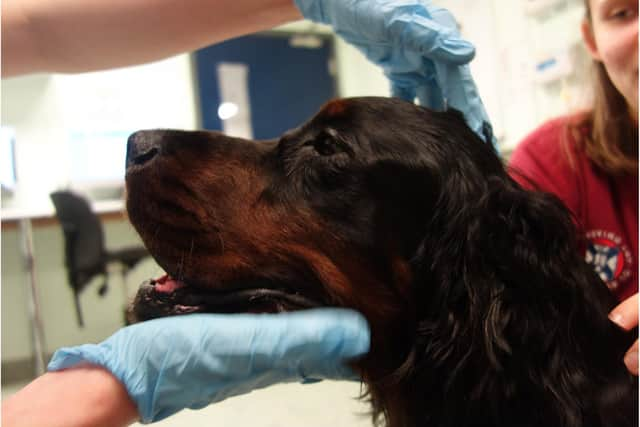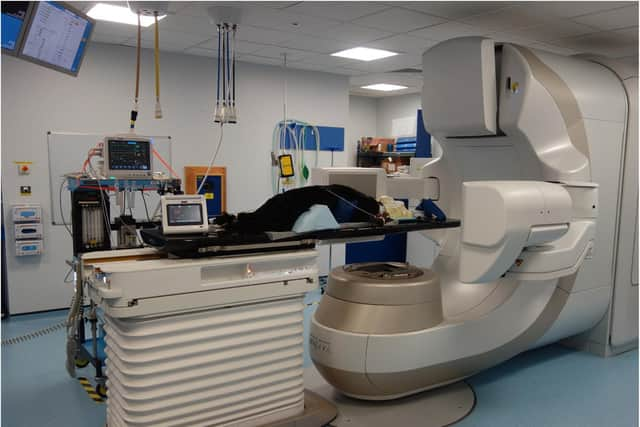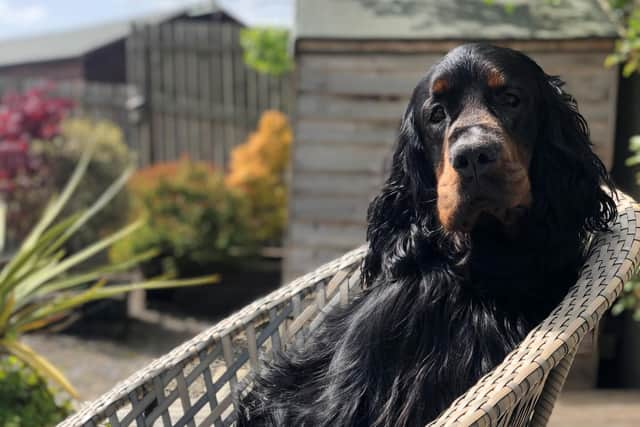Edinburgh University: Family pet first in the UK to receive specialised cancer treatment
and live on Freeview channel 276
Adorable family pet Ralph, a Gordon Setter, has been successfully treated for an aggressive cancer by a high tech therapy technique, used for the first time in the UK.
Five-year-old Ralph has a tumour on his nose which was affecting his breathing, and without treatment, was a threat to his life.


Advertisement
Hide AdAdvertisement
Hide AdHe was the first pet in the United Kingdom to receive treatment known as intensity modulated radiation therapy (IMRT) which is delivered by a linear accelerator machine called Vital Beam.
The machine is based at Edinburgh University’s Hospital for Small Animals, and thanks to the technique, Ralph’s brain and eyes were only mildly affected and there were limited side effects compared with standard treatment.
Ralph’s nosebleeds, which were the first indicator of his illness, have now stopped, and although there is a chance the tumour will come back, the vets who treated him have said that this will give him the best quality of life.
Jenna Forbes, Ralph’s owner, said: “The Dick Vet team were reassuring at a scary time and had such determination to fight for Ralph.


Advertisement
Hide AdAdvertisement
Hide Ad“We knew he was getting the best care possible and after his treatments we always brought home a dog that had been well cared for.
“His condition is significantly better now. We have such confidence in everyone at the Dick Vet, they are a dream team.”
Magdalena Parys, a radiation oncology specialist vet from the Royal (Dick) School of Veterinary Studies at Edinburgh University, added: “We are fortunate to have cutting-edge technology available for our patients.
“This advanced technology allows us to spare much more of normal healthy tissue, and gives us the ability to increase radiation doses to tumours.


Advertisement
Hide AdAdvertisement
Hide Ad“Our primary goal is to fight cancer but at the same time improve or maintain a good quality of life. We are delighted with Ralph’s progress and hope he will enjoy a good quality of life for a long time with his loving owners.”
Ralph is now back with his owners in Lanark.
A message from the Editor:
Thank you for reading this story on our website. While I have your attention, I also have an important request to make of you.
With the coronavirus lockdown having a major impact on many of our advertisers - and consequently the revenue we receive - we are more reliant than ever on you taking out a digital subscription.
Subscribe to scotsman.com and enjoy unlimited access to Scottish news and information online and on our app. With a digital subscription, you can read more than 5 articles, see fewer ads, enjoy faster load times, and get access to exclusive newsletters and content. Visit https://www.scotsman.com/subscriptions now to sign up.
Advertisement
Hide AdAdvertisement
Hide AdOur journalism costs money and we rely on advertising, print and digital revenues to help to support them. By supporting us, we are able to support you in providing trusted, fact-checked content for this website.
Comment Guidelines
National World encourages reader discussion on our stories. User feedback, insights and back-and-forth exchanges add a rich layer of context to reporting. Please review our Community Guidelines before commenting.